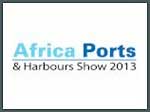Rivalry between African ports may not be a reality for some time to come, with demand almost always exceeding supply. But the pace of new transhipment port developments has increased, which may give Transnet's Ngqura port in the Eastern Cape something to be concerned about.
Ngqura was built, in part, to enhance SA's role in the container shipping and transhipment business. A transhipment facility allows large vessels to move their long-haul cargo onto smaller ships destined for regional ports. Transhipment ports are deep, to accommodate these large vessels.
Now, countries such as Nigeria, Kenya and Djibouti are building transhipment facilities of their own. All three countries presented extensive capital investment plans at the Africa Ports and Harbours Show in Sandton on Wednesday (26 June).
More importantly, securing finance is slowly becoming a reality. Djibouti's location is probably its prime asset. The small country on the Horn of Africa has a population of less than a million people but it wants to position itself as a gateway for Asian and European countries to tap into the East African market.
The port of Djibouti's commercial director, Djama Ibrahim Darar, told the conference that Djibouti will invest US$5.8bn in ports and other maritime activity over the next three years. More than 87% of the funds are already secured.
And Djibouti's transhipment port, Doraleh container terminal, is already 18m deep, compared with Ngqura's 16m.
Djibouti's plans
Other plans include a bulk terminal, specialised freight terminals, a ship repair facility, free-trade zone and new airports. Darar said feasibility studies still need to be conducted in some cases and Djibouti does require technical assistance.
For that, it has partnered with port management companies like Dubai-based DP World.
The country, which already handles 98% of all cargo destined for Ethiopia, has a stable government, and a number of successful investments in its recent past. The construction of the Doraleh terminal, for example, was completed in 2008. It is managed by DP World.
Though piracy has been a concern along the Horn of Africa, Darar believes Djibouti's links with the US (it hosts a US military base), Japan and Germany have contributed to a drop in piracy.
In Kenya, Mombasa has been unable to meet demand for years. The country plans to dredge the port and build new berths. But its focus has fallen to the proposed port of Lamu, in the northern part of the country. To fast-track the ports development, Kenya Ports Authority's project manager for Lamu, Peter Oremo, said the government is in talks with Chinese firms, who are expected to finance most of the project. It is likely to be structured as a private-public partnership (PPP).
Despite criticism of the massive scale of the project, authorities are determined to develop the 18m-deep port, at a cost of US$5.3bn. Construction is expected to begin next year.
Lamu port project
The port is just one element of the Lamu Port-South Sudan-Ethiopia corridor, which is expected to come with a US$22.3bn price tag. Its primary aim is to link Lamu with the oilfields in South Sudan.
Aside from the port and a new oil terminal, it includes a highway, railway line, resort cities, new airports and an oil refinery. Oremo said investors can expect a 20% rate of return on average for all the projects on the corridor.
Meanwhile, trade flows to Nigeria have long been hamstrung by severe congestion at the Lagos port. Its plans to build the ambitious Ibaka deep-sea port, will eye transhipment traffic from the US and Europe.
Musa Wada, an engineer at the Nigerian Ports Authority, said Ibaka has a natural depth of 17.5m, but is likely to accommodate 15m vessels.
Ibaka will also be a PPP, of which private partners are expected to invest 60% of the cost. The port development will be planned with a free trade zone.
Should SA's logistics group Transnet be concerned about port infrastructure development elsewhere on the continent? "Absolutely not," said Transnet Port Terminals chief executive Karl Socikwa.
"We are excited about the progress. Everyone will benefit from a fully developed competent transport infrastructure in Africa," he said
Socikwa says collaboration will be an essential element of an optimised African logistics supply chain.
He says Transnet Port Terminals is devising a regional ports plan to improve integration. It has also made its general cargo operating system available to ports in Benin and the Democratic Republic of Congo and is considering a regional transhipment strategy.
Source: Business Day via I-Net Bridge





![By PMO - Ethiopia - [1], Public Domain,](https://biz-file.com/c/2509/787241-300x156.jpg?5)






































